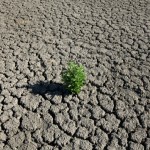Getting Serious About a Texas-Size Drought
From the Texas Tribune:
Something odd happened here last week.
It rained.
But the relief, an answer to desperate prayers, is likely to be short-lived. The drought that has gripped much of Texas since the fall of 2010 shows few signs of abating soon. The latest forecasts say that parched West and South Texas will remain dry, and that the state is likely to see above-average temperatures this spring, increasing evaporation from already strained reservoirs. The conditions could lead to severe water restrictions in some parts of the state.
The implications have finally sunk in among lawmakers and business leaders here, who like to boast about the economic appeal of Texas’ low taxes and relaxed regulatory environment: No water equals no business. In a state fabled for its everything-is-bigger mentality, the idea of conserving resources is beginning to take hold. They are even turning sewage into drinking water.
The overwhelmingly conservative Texas House recently voted to create a fund to finance water development and conservation projects and is considering allocating $2 billion to jump-start it. The state Senate is weighing a similar measure. The state’s water plan, released last year, recommends spending $57 billion over the next half-century to ensure there is enough water to go around; Texas’ population of 26 million is expected to grow by 80 percent by 2060.
Texas is also suing neighboring states to get more water. The U.S. Supreme Court is scheduled to hear arguments in two weeks in one of these cases, in which the authority that supplies water to Fort Worth and fast-growing surrounding communities is demanding more water from Oklahoma. Texas has accused New Mexico of siphoning off more than its share of water from the Rio Grande. The state is likewise arguing that under an international agreement, it is entitled to more water from Mexico, which has also been stricken by drought.
Other desperately dry states in the Midwest and West are facing similar challenges. Drought has hurt farmers in New Mexico and reduced California’s crucial mountain snowpack. Even the Great Lakes are at worryingly low levels. Drought conditions in the western half of the country are likely to persist at least through June, federal forecasters have warned. Over time, as the effects of climate change become more pronounced, hotter weather and longer dry spells will continue to threaten water supplies that are essential for development.
Already the drought has led to consideration of wild, expensive ideas, like piping water hundreds of miles from the Missouri River to the parched Colorado River basin. Water traditionally has been mostly a state or local issue because communities draw supplies from nearby rivers or aquifers. But increasingly it is becoming a national one. Economies will rise and fall on the availability of water, whose price is inexorably marching upward. Litigation and rural-urban water conflicts are likely to intensify throughout the West and Midwest.
“Texas does not and will not have enough water” in a bad drought, the state’s water plan warned last year. More than two dozen communities could run out of water in 180 days, according to the Texas Commission on Environmental Quality. Looking ahead, the already-dry western half of the state is expected to be hit particularly hard by climate change. State leaders generally accept such projections, even as they question the scientific consensus that humans are a major cause of climate change.
Officials from Gov. Rick Perry on down are focused on expanding water supplies. Doing nothing could create “a reputation that Texas is not a business-friendly state,” state Rep. Lyle Larson, R-San Antonio, warned fellow lawmakers last month. Bill Hammond, president of the Texas Association of Business, agrees. “Clearly, not having an adequate water supply will harm us in terms of bringing jobs to Texas and is doing so now, already,” he said recently.
Cargill, the giant food producer, idled a beef-processing plant in Plainview in the Panhandle this year after ranchers thinned their herds because of dry pastures and soaring hay prices. Some 2,000 people lost their jobs in the town of 22,000. Power plants and other industrial operations that depend on water are also worried. One community close to Austin nearly ran out of water last year and had to truck in supplies. That’s a public relations disaster for a state that brags that it does things better than other places.
In a promising twist, a cultural shift seems to be under way. Conserving water is now seen as a priority in a state that dislikes conserving just about anything else.
Midland, an arid West Texas town at the epicenter of the current oil boom, had never imposed watering restrictions until a few years ago. Residents liked coming home to green lawns after a day in the dusty oil fields. Watering rules smacked of big government.
Then drought caused reservoir levels to drop alarmingly. Midland imposed sharp restrictions on outdoor watering and hiked rates, albeit temporarily, on water hogs. Other innovations are on the way: A project to turn sewage into potable water will soon bolster Midland’s drinking supplies, a concept that has drawn interest from around the state and nation.
Wes Perry, an oilman who doubles as Midland’s mayor, put it this way recently: As valuable as oil and gas are, he said, “we are worthless without water.”

